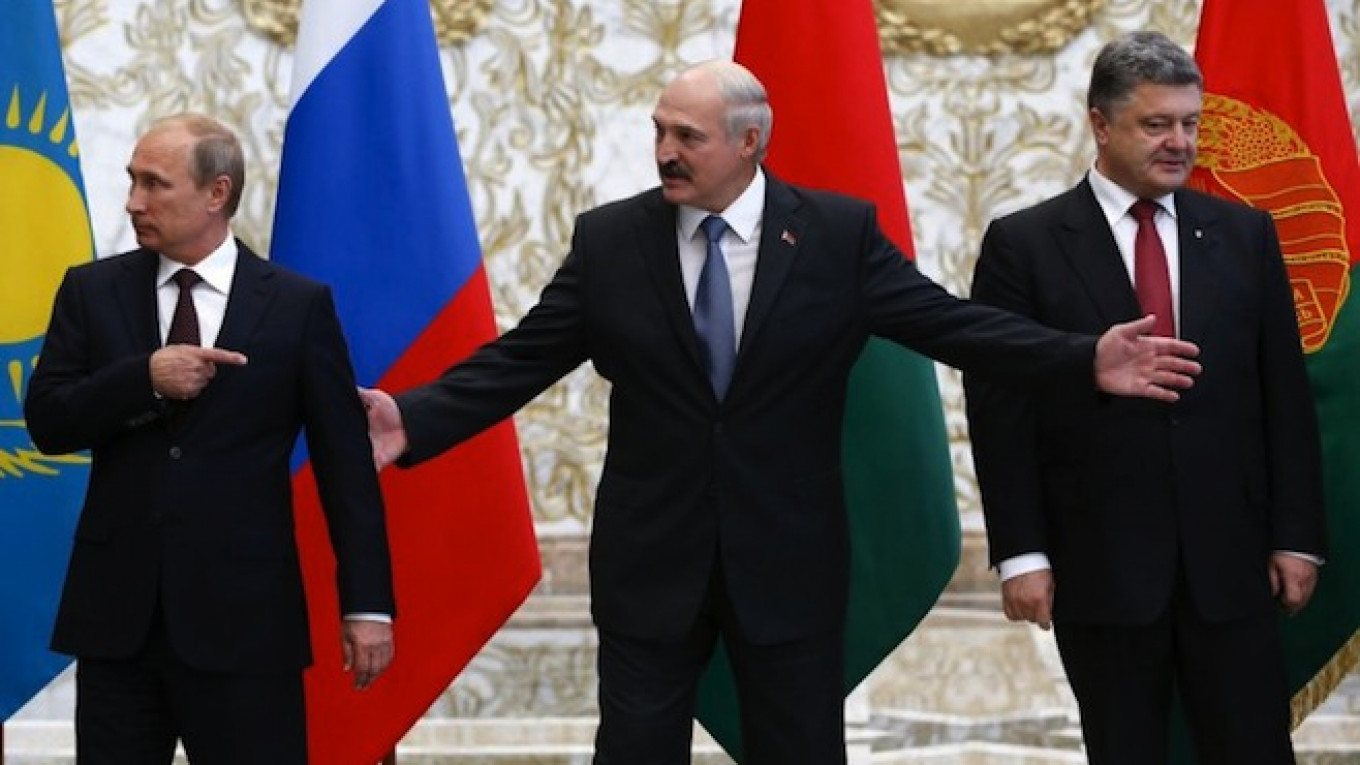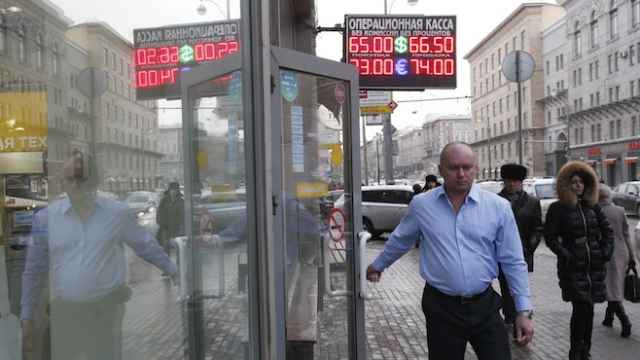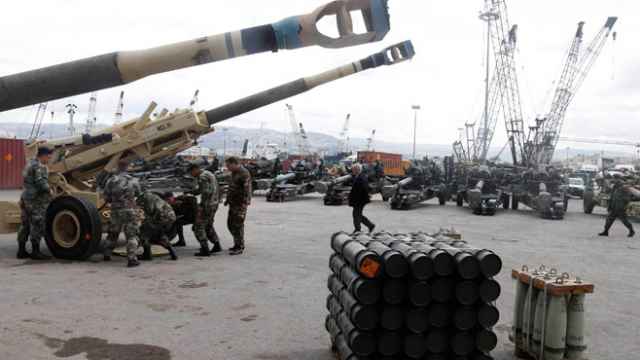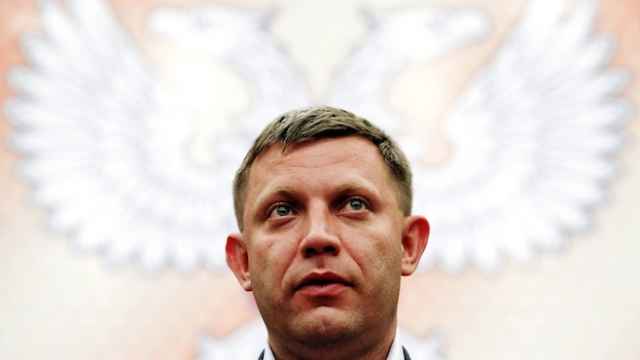The leaders of France, Germany, Russia and Ukraine plan to hold a summit on the Ukraine crisis in the Belarussian capital of Minsk on Wednesday. Here is an outline of the sides' positions before the meeting.
Minsk Protocol
The four sides say any agreement must be based on an agreement reached in Minsk by the Ukrainian government and the pro-Russian separatists they are fighting on Sept. 5 last year. The main points of the 12-point Minsk Protocol, which has failed to go into full force, are:
— An immediate bilateral cease-fire
— Withdrawal of illegal armed groups and military equipment as well as fighters and mercenaries from Ukraine
— Monitoring and verification of the cease-fire by the Organization for Security and Cooperation in Europe (OSCE)
— Decentralization of power to the rebel-held regions of Donetsk and Luhansk
— Monitoring of the Ukrainian-Russian border by the OSCE and the creation of security zones in the border regions
— Release of all hostages and illegally detained persons
— Continuation of "inclusive national dialogue"
— Early local elections in Donetsk and Luhansk
— A follow-up memorandum signed on Sept. 19 said that both sides should also pull back heavy artillery by 15 kilometers from a frontline defined in the memorandum
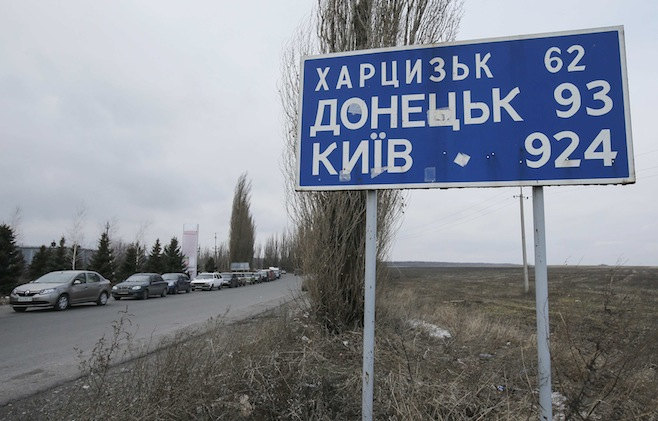
Cars queue to reach a border crossing point, before driving into Russian territory, outside the village of Uspenka, Donetsk region.
Ukraine
Kiev's pro-Western authorities have underlined the following demands in public statements:
— Any agreement must be based on the demarcation line drawn up under the Minsk agreements
— There must be a cease-fire and the withdrawal of heavy weapons from the line of confrontation
— Kiev opposes the "federalization" of Donetsk and Luhansk regions but is ready to provide more autonomy and respect Russian-language rights in these mainly Russian-speaking regions
— Kiev wants control of the state border with Russia to stop the flow of Russian fighters and military equipment into Ukraine
— Kiev wants a complete withdrawal of foreign troops from the territory of Luhansk and Donetsk regions
— It opposes introduction of a peacekeeping contingent
Russia
Russia, which blames the conflict on Kiev and the West, set out its position in a letter from President Vladimir Putin to President Petro Poroshenko this month. The contents have not been made public but Russian officials say:
— Luhansk and Donetsk must have more autonomy as part of a broader decentralization of power
— Kiev must engage in direct dialogue with the rebel regions
— Russia recognizes the territorial integrity of Ukraine
— Russia rules out handing back Crimea to Ukraine after annexing it last March, citing a referendum which supported such a move
— Putin also sent a letter to Poroshenko in January which emphasized the need for heavy artillery to be withdrawn from "the actual line of contact", an apparent departure from the Minsk agreements because of rebel territorial gains since September. However, on Jan. 21 the Russian, Ukrainian, German and French foreign ministers agreed in Berlin that the withdrawal should be based on the line agreed in Minsk
— Russian officials have made clear they want Ukraine to remain neutral and oppose it joining NATO, but have not presented this as a formal condition for a diplomatic solution
— Russian and foreign media have speculated on Putin's long-term goals for Ukraine. Some say Putin wants a "frozen" or unsolved conflict in the east that allows Russia to retain influence in Ukraine, while others say that his goal is continuing instability to weaken Ukraine's pro-western leaders
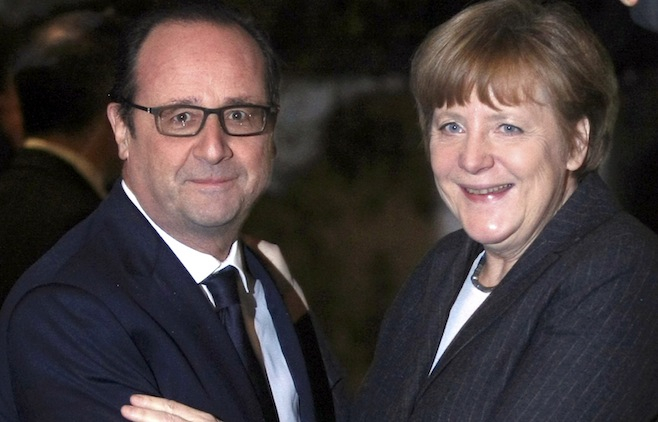
French President Francois Hollande (L) greets German Chancellor Angela Merkel, prior to their informal dinner at the restaurant, Zum Ysehuet, in Strasbourg.
Europe
France and Germany say they are representing Europe and, as such, are united behind one position
— Both want a diplomatic agreement for a lasting peace accord but Paris in particular has said the time for diplomacy cannot be extended indefinitely
— Germany and France hold out the threat of more sanctions if there is no peace deal, though the European Union is putting off the next stage of sanctions to give peace a chance.
— France and Germany oppose any supply of lethal weapons to Ukraine, as being discussed by the United States
— Paris and Germany, with their EU colleagues, say Russia has sent arms and troops to east Ukraine to back the separatists and that Moscow must pull these arms and forces out. Moscow denies the accusations
— In the event of a deal, Paris does not have any problem in principle with the idea of sending in OSCE observers to monitor demilitarized zones and the withdrawal of heavy arms.
— French officials have not talked in public about whether any future accord should recognize gains made since the first Minsk accord by pro-Russian rebels. The non-negotiable principle is that Ukraine's territorial integrity must be respected even if more decentralization is possible in the east of the country.
The Rebel Separatists
— Rebel representatives have said that the demarcation line agreed in the Minsk talks is no longer appropriate and that they won't withdraw from their current positions
— They have also said that an autonomous position or special status inside Ukraine is "unrealistic" and that they seek "independence"
— They have also emphasized the need for an end to a Ukrainian economic "blockade" of the two regions
A Message from The Moscow Times:
Dear readers,
We are facing unprecedented challenges. Russia's Prosecutor General's Office has designated The Moscow Times as an "undesirable" organization, criminalizing our work and putting our staff at risk of prosecution. This follows our earlier unjust labeling as a "foreign agent."
These actions are direct attempts to silence independent journalism in Russia. The authorities claim our work "discredits the decisions of the Russian leadership." We see things differently: we strive to provide accurate, unbiased reporting on Russia.
We, the journalists of The Moscow Times, refuse to be silenced. But to continue our work, we need your help.
Your support, no matter how small, makes a world of difference. If you can, please support us monthly starting from just $2. It's quick to set up, and every contribution makes a significant impact.
By supporting The Moscow Times, you're defending open, independent journalism in the face of repression. Thank you for standing with us.
Remind me later.


